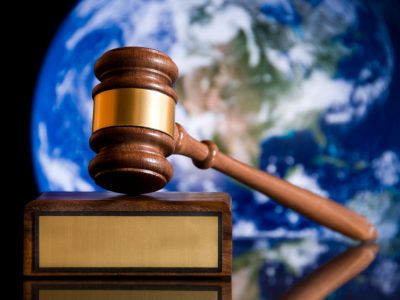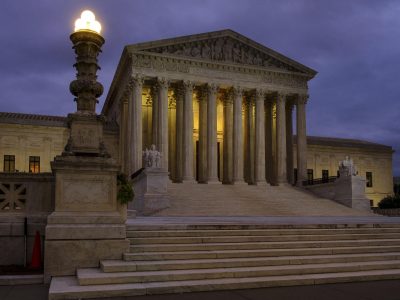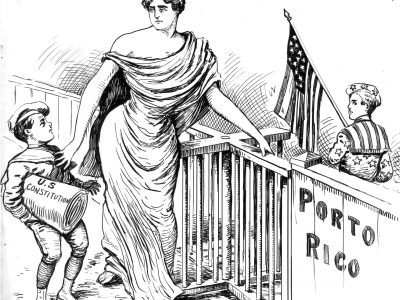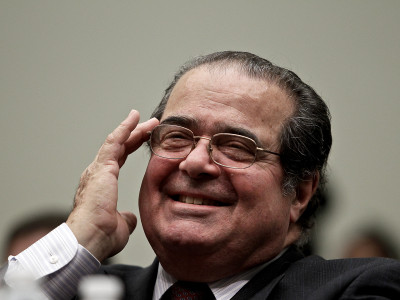Supreme Court
Removing Climate Liability Plaintiffs from State Court Could Create Logjam in Federal Courts
The U.S. Supreme Court is set to decide a nuanced issue of procedural law that could create a loophole which would dramatically expand the reach of federal appellate jurisdiction and prevent climate plaintiffs from suing oil companies in state court.
As recent extreme heat waves, hurricanes, and wildfires across the country have elevated public concern about the widespread and harmful effects of climate change, the U.S. Supreme Court granted certiorari this month in a climate liability case called BP P.L.C. v. Mayor and City Council of Baltimore. In short, the City of Baltimore sued a …
CONTINUE READINGBarrett on Standing & Judicial Deference
Her mentor was Scalia, but her style is more like Souter.
With the help of my research assistant, I’ve collected cases by Judge Barrett dealing with standing issues and deference to administrative agencies. Both topics are very relevant to the environment.al crisis. You really can’t draw firm conclusions about her views on these doctrines, but you can draw conclusions about her style. She sticks close to …
Continue reading “Barrett on Standing & Judicial Deference”
CONTINUE READINGFighting Global Warming in a Chilly Judicial Climate
A 6-3 conservative court is bad news for climate action. Here’s a threat assessment.
With Romney’s announcement this morning that he would support consideration of a nominee before the election, it now seems virtually certain that Trump will be able to appoint a sixth conservative Justice. How will that affect future climate policy? Here is a preliminary threat assessment. The answer varies, depending on what policies we’re talking about. …
Continue reading “Fighting Global Warming in a Chilly Judicial Climate”
CONTINUE READINGThe Kavanaugh Court and the Environment
A new appointment would make Justice Kavanaugh the swing voter. Here’s what that would mean for environmental law.
A new appointment by Trump would shift the Supreme Court well to the right, making Brett Kavanaugh the swing voter in many cases. Kavanaugh has clear views about the powers of agencies like EPA. With him as the swing voter, the main strategy used by Obama to make environmental progress would be off limits for …
Continue reading “The Kavanaugh Court and the Environment”
CONTINUE READINGConstitutional Rights in a Pandemic
When does public health override individual rights?
Lockdowns and social distancing impinge on activities that are protected by the Constitution. That’s been true in many states of church services and in some states of abortion. When the cases have come before they courts, they have often turned to a 1905 Supreme Court case decision, Jacobson v. Massachusetts, which upheld a state law …
Continue reading “Constitutional Rights in a Pandemic”
CONTINUE READINGD.C. and Puerto Rico are not the same.
Blanket calls for D.C. and Puerto Rico statehood miss a critical difference: D.C. is the American capital. Puerto Rico is an American colony.
“D.C. and Puerto Rico should be states. Pass it on.” With passage of the D.C. statehood bill in the House of Representatives last Friday, variations on this statement have been gaining traction as a liberal rallying cry. Because they are not states, neither D.C. nor Puerto Rico have voting representation in Congress. The votes of …
Continue reading “D.C. and Puerto Rico are not the same.”
CONTINUE READINGOn This Date in History: Property Rights Won Big in the Supreme Court
June 29, 1992 was a great day for property rights advocates. But what came later wasn’t so good.
On this date in 1992, the property rights movement achieved its greatest victory in the form of the Supreme Court’s Lucas ruling. The campaign to protect property rights seemed to have huge momentum. But things didn’t work out that way. For property rights advocates, Lucas turned out to be a false dawn. Mr. Lucas owned …
Continue reading “On This Date in History: Property Rights Won Big in the Supreme Court”
CONTINUE READINGFancy Dancing on the Appalachian Trail
How to Use Textualism to Evade Statutory Texts
The Supreme Court’s decision in Cowpasture case allows gas pipelines to cross the Appalachian trial. The ruling didn’t get much attention because of its timing. It came down the same day as Bostock, which outlawed employment discrimination against gays and transsexuals. Bostock featured a big battle over the meaning of textualism. But Cowpasture was also …
Continue reading “Fancy Dancing on the Appalachian Trail”
CONTINUE READINGThe Coronavirus and the Commerce Clause
Could Congress mandate CORVID-19 vaccinations? Not if you take some Supreme Court opinions seriously.
If we get a vaccine against a national epidemic, could Congress pass a law requiring everyone to get vaccinated? That very question was asked during the Supreme Court argument in the 2012 constitutional challenge to Obamacare’s individual mandate. The lawyer challenging Obamacare said “no, Congress couldn’t do that.” What’s shocking is that this may have …
Continue reading “The Coronavirus and the Commerce Clause”
CONTINUE READINGDoes the Constitution Exempt Churches from Social Distancing?
Short answer: “No.” And it might even be unconstitutional for states to grant such exemptions.
Most religious groups have willingly complied with public health limits on large gatherings. But not all. These claims of religious exemption, and some states’ responses to them, raise important constitutional issues. There have been a couple of cases in the spotlight. Rodney Howard-Browne is a Florida preacher who prayed over Trump in the Oval Office …
Continue reading “Does the Constitution Exempt Churches from Social Distancing?”
CONTINUE READING












